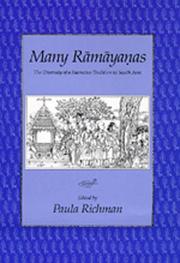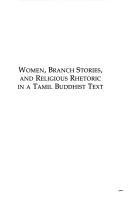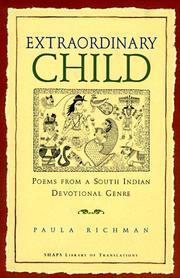| Listing 1 - 10 of 10 |
Sort by
|

ISBN: 0520072812 0520075897 052091175X 0585104441 9780520911758 9780585104447 9780520072817 9780520075894 Year: 1991 Publisher: Berkeley: University of California press,
Abstract | Keywords | Export | Availability | Bookmark
 Loading...
Loading...Choose an application
- Reference Manager
- EndNote
- RefWorks (Direct export to RefWorks)
Throughout Indian history, many authors and performers have produced, and many patrons have supported, diverse tellings of the story of the exiled prince Rama, who rescues his abducted wife by battling the demon king who has imprisoned her. The contributors to this volume focus on these "many" Ramayanas. While most scholars continue to rely on Valmiki's Sanskrit Ramayana as the authoritative version of the tale, the contributors to this volume do not. Their essays demonstrate the multivocal nature of the Ramayana by highlighting its variations according to historical period, political context, regional literary tradition, religious affiliation, intended audience, and genre. Socially marginal groups in Indian society--Telugu women, for example, or Untouchables from Madhya Pradesh--have recast the Rama story to reflect their own views of the world, while in other hands the epic has become the basis for teachings about spiritual liberation or the demand for political separatism. Historians of religion, scholars of South Asia, folklorists, cultural anthropologists--all will find here refreshing perspectives on this tale.
Indic literature --- Råama (Hindu deity) in literature --- Såitåa (Hindu deity) in literature --- Languages & Literatures --- Indo-Iranian Languages & Literatures --- History and criticism --- Rāma (Hindu deity) in literature. --- Rāma (Hindu deity) in literature. --- Sītā (Hindu deity) in literature. --- Sītā (Hindu deity) in literature. --- History and criticism. --- Kampar, --- Tulasīdāsa, --- Vālmīki. --- Rāma --- Sita --- In literature --- Seeta --- Seetha --- Siya --- Vaidehi --- Janaki --- Maithili --- Bhoomija --- Rāghava --- Ramachandra --- Ram
Book
ISBN: 9786611726515 1281726516 0253000157 9780253000156 6611726519 9781281726513 9780253349880 0253349885 9780253219534 0253219531 Year: 2008 Publisher: Bloomington Indiana University Press
Abstract | Keywords | Export | Availability | Bookmark
 Loading...
Loading...Choose an application
- Reference Manager
- EndNote
- RefWorks (Direct export to RefWorks)
Fresh perspectives on the classic Indiana epic
Dravidian literature --- Indic literature --- Vālmīki --- Wālmīki --- Bālmīki --- Wālamīki --- Wānmīki --- Vaalmeeki --- والميكى --- Vālmīki --- Valmiki

ISBN: 0915984903 Year: 1988 Publisher: Syracuse (N.Y.) : Syracuse university. Maxwell school of citizenship and public affairs,
Abstract | Keywords | Export | Availability | Bookmark
 Loading...
Loading...Choose an application
- Reference Manager
- EndNote
- RefWorks (Direct export to RefWorks)
Book
ISBN: 9780195650914 Year: 2000 Publisher: New Delhi : Oxford University Press,
Abstract | Keywords | Export | Availability | Bookmark
 Loading...
Loading...Choose an application
- Reference Manager
- EndNote
- RefWorks (Direct export to RefWorks)
Indic literature --- Rāma (Hindu deity) in literature. --- History and criticism. --- Vālmīki. --- Tulasīdāsa,
Book
ISBN: 9780824862442 Year: 1997 Publisher: Honolulu
Abstract | Keywords | Export | Availability | Bookmark
 Loading...
Loading...Choose an application
- Reference Manager
- EndNote
- RefWorks (Direct export to RefWorks)
Multi
ISBN: 9780824862442 Year: 1997 Publisher: Honolulu, Hawaii University of Hawaii Press
Abstract | Keywords | Export | Availability | Bookmark
 Loading...
Loading...Choose an application
- Reference Manager
- EndNote
- RefWorks (Direct export to RefWorks)
Book
ISBN: 9780197552513 Year: 2021 Publisher: New York : Oxford University Press,
Abstract | Keywords | Export | Availability | Bookmark
 Loading...
Loading...Choose an application
- Reference Manager
- EndNote
- RefWorks (Direct export to RefWorks)
"Performing the Ramayana Tradition: Enactments, Interpretations, and Arguments, edited by Ramayana scholar Paula Richman and Rustom Bharucha, scholar of Theater and Performance Studies, examines diverse retellings of the Ramayana narrative as interpreted and embodied through a spectrum of performances. Unlike previous publications, this book is neither a monograph on a single performance tradition nor a general overview of Indian theatre. Instead, it provides context-specific analyses of selected case studies that explore contemporary enactments of performance traditions and the narratives from which they draw: Kutiyattam, Nangyarkuttu and Kathakali from Kerala; Kattaikkuttu and a "mythological" drama from Tamilnadu; Talamaddale from Karnataka; avant-garde performances from Puducherry and New Delhi; a modern dance-drama from West Bengal; the monastic tradition of Sattriya from Assam; anti-caste plays from North India; and the Ramnagar Ramlila. Apart from the editors' two introductions, which orient readers to the history of Ramayana narratives by Tulsidas, Valmiki, Kamban, Sankaradeva, and others, as well as the performance vocabulary of their enactments, the volume includes many voices, including those of directors, performers, scholars, connoisseurs, and the scholar-abbot of a monastery. It also contains two full scripts of plays, photographs of productions, interviews, conversations, and a glossary of Indian terms. Each essay in the volume, written by an expert in the field, is linked to several others, clustered around shared themes: the politics of caste and gender, the representation of the anti-hero, contemporary re-interpretations of traditional narratives, and the presence of Ramayana discourse in everyday life"--
Acting --- Performance --- Performing arts --- Religious aspects --- Hinduism. --- Kampar, --- Tulasīdāsa, --- Vālmīki --- Vālmīki. --- Rāmacaritamānasa (Tulasīdāsa). --- Rāmāyaṇa (Vālmīki). --- Rāmāyaṇam (Kampar).

ISBN: 058533241X 0824810635 0824862449 Year: 1997 Publisher: University of Hawai'i Press
Abstract | Keywords | Export | Availability | Bookmark
 Loading...
Loading...Choose an application
- Reference Manager
- EndNote
- RefWorks (Direct export to RefWorks)
Book

ISBN: 9780691216263 Year: 2021 Publisher: Princeton, NJ
Abstract | Keywords | Export | Availability | Bookmark
 Loading...
Loading...Choose an application
- Reference Manager
- EndNote
- RefWorks (Direct export to RefWorks)
Multi

ISBN: 9780691216263 Year: 2021 Publisher: Princeton, N.J. Princeton University Press
Abstract | Keywords | Export | Availability | Bookmark
 Loading...
Loading...Choose an application
- Reference Manager
- EndNote
- RefWorks (Direct export to RefWorks)
| Listing 1 - 10 of 10 |
Sort by
|

 Search
Search Feedback
Feedback About UniCat
About UniCat  Help
Help News
News